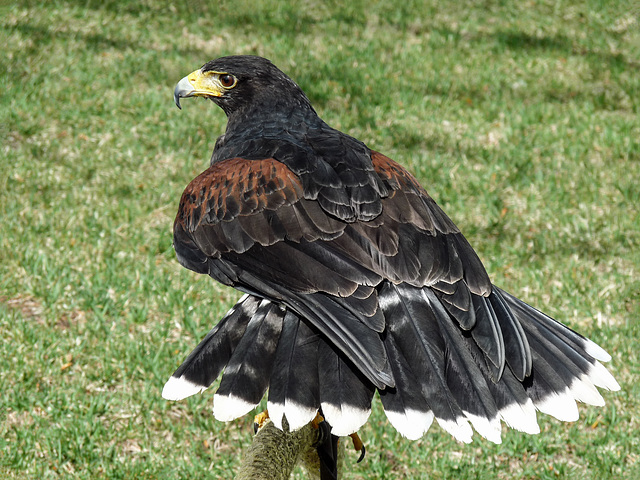Elephants from the archives
Who could resist this face?
Caught between a rock and a hard place
Goat's-beard
Pretty little lady
Hiding in the moss
Redhead
Just a few more weeks
Aspens in winter
Half way open
Fragile beauty
Swainson's Hawk
Beynon Ecological Preserve
A favourite flower
Forest beauty
Tropical pink
Visiting the city
Winter's splendour
Ferruginous Hawk
Common Indian Crow butterfly (Euploea core)
Showing its age
Colourful bokeh
Keeping her young ones warm
The endless wait
American Three-toed Woodpecker
Beynon Ecological Preserve
King Penguin
Cascade Mt., Banff
Ruddy Duck
Nothing but fluff
Welcome colour
Another lucky Weasel shot
Sunrise over the mountains
A quick stop on the railings
Herronton Elevator
Fully focused
Colourful trio
Highlight of the day
Soft pink
The simplicity of freedom
Watching us closely
For yet another snowy day
Rather a fine old barn
Wind effect
Columbine
See also...
Keywords
Authorizations, license
-
Visible by: Everyone -
All rights reserved
-
187 visits
Harris's Hawk


I saw this Harris's Hawk at the Coaldale Bird of Prey Centre, southern Alberta, on 16 May 2009. A few, rare sightings have been reported in Alberta.
"The Harris's Hawk or Harris Hawk, formerly known as the Bay-winged Hawk, (Parabuteo unicinctus), is a medium-large bird of prey which breeds from the southwestern USA south to Chile and central Argentina. It is the only member of the genus Parabuteo, which literally means 'similar to Buteo'.
Its habitat is sparse woodland and semi-desert, as well as marshes (with some trees) in some parts of its range, including mangrove swamps, as in parts of its South American range. It nests in a tree and lays 2–4 eggs, incubated for 28 days to hatching.
It has blackish brown plumage with chestnut forewings (above and below) and thighs. The end of the tail and the rump are white. It has a length of 60 cm and a wingspan of 1.2 m; the average weight is about 900 g (2 pounds). Females are typically 10% bigger than males.
Harris's Hawks' social behavior is unusual for raptors. Young may stay with their parents for up to three years, helping to raise later broods. They also hunt together, groups of two to six birds often cooperating to flush and then capture prey (group hunting). In contrast, the vast majority of raptors are solitary hunters, and not at all gregarious.
This social behavior gives Harris's Hawks an easygoing nature that makes them desirable captive birds. Since about 1980, Harris's Hawks have been increasingly used in falconry and are now the most popular hawks in the West (outside of Asia) for that purpose, as they are the easiest to train and the most affectionate.
Hunting with Harris's Hawks often works best with two or more birds. (In contrast most other raptors cannot be flown together, as they will attack each other.) When prey is flushed, the birds can work together to corner the animal – compensating for their relatively low acceleration and speed. Harris's Hawks will happily treat the falconer as a hunting partner, and will follow from tree to tree and perch until the falconer flushes a rabbit from the bushes.
They can easily catch and kill a rabbit, a hare or even a pheasant, but its natural prey are small rodents and reptiles." From Wikipedia.
"The Harris's Hawk or Harris Hawk, formerly known as the Bay-winged Hawk, (Parabuteo unicinctus), is a medium-large bird of prey which breeds from the southwestern USA south to Chile and central Argentina. It is the only member of the genus Parabuteo, which literally means 'similar to Buteo'.
Its habitat is sparse woodland and semi-desert, as well as marshes (with some trees) in some parts of its range, including mangrove swamps, as in parts of its South American range. It nests in a tree and lays 2–4 eggs, incubated for 28 days to hatching.
It has blackish brown plumage with chestnut forewings (above and below) and thighs. The end of the tail and the rump are white. It has a length of 60 cm and a wingspan of 1.2 m; the average weight is about 900 g (2 pounds). Females are typically 10% bigger than males.
Harris's Hawks' social behavior is unusual for raptors. Young may stay with their parents for up to three years, helping to raise later broods. They also hunt together, groups of two to six birds often cooperating to flush and then capture prey (group hunting). In contrast, the vast majority of raptors are solitary hunters, and not at all gregarious.
This social behavior gives Harris's Hawks an easygoing nature that makes them desirable captive birds. Since about 1980, Harris's Hawks have been increasingly used in falconry and are now the most popular hawks in the West (outside of Asia) for that purpose, as they are the easiest to train and the most affectionate.
Hunting with Harris's Hawks often works best with two or more birds. (In contrast most other raptors cannot be flown together, as they will attack each other.) When prey is flushed, the birds can work together to corner the animal – compensating for their relatively low acceleration and speed. Harris's Hawks will happily treat the falconer as a hunting partner, and will follow from tree to tree and perch until the falconer flushes a rabbit from the bushes.
They can easily catch and kill a rabbit, a hare or even a pheasant, but its natural prey are small rodents and reptiles." From Wikipedia.
- Keyboard shortcuts:
Jump to top
RSS feed- Latest comments - Subscribe to the comment feeds of this photo
- ipernity © 2007-2024
- Help & Contact
|
Club news
|
About ipernity
|
History |
ipernity Club & Prices |
Guide of good conduct
Donate | Group guidelines | Privacy policy | Terms of use | Statutes | In memoria -
Facebook
Twitter

Sign-in to write a comment.